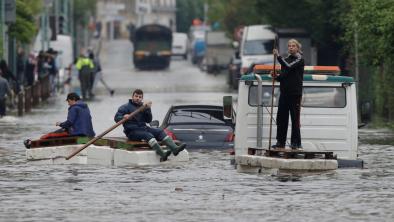Science Source
Climate-change effects on extreme precipitation in central Europe: uncertainties of scenarios based on regional climate models
- States observations as well as most climate model simulations are generally in accord with the hypothesis that the hydrologic cycle should intensify and become highly volatile with the greenhouse-gas-induced climate change, although uncertainties of these projections as well as the spatial and seasonal variability of the changes are much larger than for temperature extremes
- Examines scenarios of changes in extreme precipitation events in 24 future climate runs of ten regional climate models, focusing on a specific area of the Czech Republic (central Europe) where complex orography and an interaction of other factors governing the occurrence of heavy precipitation events result in patterns that cannot be captured by global models
- Uses the SRES-A2 and SRES-B2 greenhouse gas emission scenarios
- Results show that heavy precipitation events are likely to increase in severity in winter and (with less agreement among models) also in summer
- Finds the inter-model and intra-model variability and related uncertainties in the pattern and magnitude of the change is large, but the scenarios tend to agree with precipitation trends recently observed in the area, which may strengthen their credibility
- States in most scenario runs, the projected change in extreme precipitation in summer is of the opposite sign than a change in mean seasonal totals, the latter pointing towards generally drier conditions in summer
- Finds a combination of enhanced heavy precipitation amounts and reduced water infiltration capabilities of a dry soil may severely increase peak river discharges and flood-related risks in this region
Related Content
Headline

Jun 5, 2016 | Grist
Record-breaking floods hit Paris. Get used to it.
Headline

Jun 5, 2016 | The Big Story
Paris museum reopens as French floods slowly ease
Headline

Jun 5, 2016 | Climate News Network
Europe's floods come as no surprise
Science Source
| Hydrology and Earth System Sciences
Understanding flood regime changes in Europe: a state-of-the-art assessment
Hall, J., Arheimer et al


